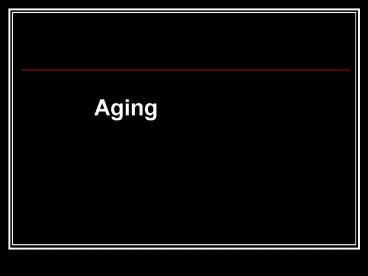Aging - PowerPoint PPT Presentation
1 / 25
Title:
Aging
Description:
... from text only, 2 from lecture only, 8 from ... Test Tips. Use first two exams as learning experience. ... And in lecture only. Use the time (will have 2 hours) ... – PowerPoint PPT presentation
Number of Views:38
Avg rating:3.0/5.0
Title: Aging
1
Aging
2
AgingReasons for InterestMethodologyIntellig
ence IQ MemoryGeneral Conclusions
3
Memory and Aging
4
Memory and Aging
- Recognition-Recall
5
Memory and Aging
- Recognition-Recall
- Mnemonic strategies
6
Disuse Hypothesis Theory that cognitive skills
that are not regularly used become harder to
access when needed
7
Memory and Aging
- Recognition-Recall
- Mnemonic strategies
- Speed
8
Memory and Aging
- Recognition-Recall
- Mnemonic strategies
- Speed
- Knowledge base-constructive memory
9
Mrs. Brown goes to the park every afternoon if
the weather is fine. She likes to watch the
children playing, and she feeds the ducks with
bread crusts. She enjoys the walk there and back.
For the last three days it has been raining all
the time although its the middle of the summer,
and the town is still full of people on holiday.
10
1. What does Mrs. Brown give the ducks to
eat?2. Did Mrs. Brown go to the park
yesterday?
11
Memory and Aging
- Recognition-Recall
- Mnemonic strategies
- Speed
- Knowledge base-constructive memory
- Everyday memory
12
Prospective memory Remembering to perform a
planned action in the future
13
Examples of Items from the Memory Assessment
Clinics Self-Rating ScaleAbility ScaleTarget
of MeasurementAbility to remember specific
types of informationrated on a 5-point scale
from very poor to very goodExamplesDetails of
family events that occurred during the past
yearThe name of a person just introduced to you
Where you put objects (such as keys) in the home
or officeMeanings of words you once knew fairly
wellHow to reach a geographic location you have
visited once or twice
14
Frequency of Occurrence ScaleTarget of
MeasurementFrequency of occurrence of specific
memory problemsrated on a 5-point scale from
very often to very rarelyExamplesHave
difficulty recalling a word you wish to use.Miss
the point someone else is making during a
conversation.Go into a room to get something and
forget what you are after.Forget an appointment
or other event that is very important to
you.Fail to recognize people who recognize you.
15
Memory and Aging
- Recognition-Recall
- Mnemonic strategies
- Speed
- Knowledge base-constructive memory
- Everyday memory
- Remote memory
16
Remote Memory Memory for events from the distant
past
17
Remote memory Memory for events from the distant
past
- Botwinick Storandt
- Bahrick, Bahrick, Wittlinger
18
Bases for Apparent Decline
- Cultural and test biases
- Biological processes
- Social processes
19
Review SessionsThursday, December 10,
130-230Room 151 PsychologyWednesday,
December 16, 130-230Room TBA
20
Office HoursVD Mon 5th SM Mon 6th 7th
Wed, 12/16, 12-130
21
Exam
22
Exam
- 50 points
- 30 multiple-choice1 point each
- 10 of 12 definitions2 points each
23
Of 30 multiple-choice, 5 from text only, 5 from
lecture only, 20 from both sourcesOf 12
definitions, 2 from text only, 2 from lecture
only, 8 from both sources
24
Most heavily weighted Chapters 11 and 14 Next
most Chapter 13
25
Test Tips
- Use first two exams as learning experience.
- Definitions neednt be verbatimwhen studying,
put in own words. - Concentrate on topics covered in both text and
lecture. - And in lecture only.
- Use the time (will have 2 hours)































